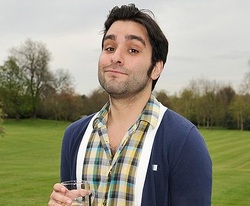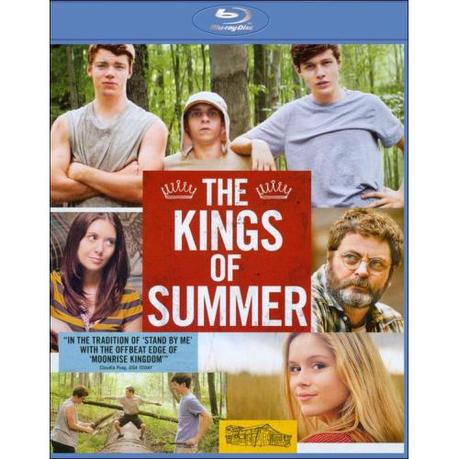The Kings of Summer had its premiere at the 2013 Sundance Film Festival, where it played in U.S. Dramatic Competition. The movie also won the Narrative Feature Audience Award at the Dallas International Film Festival.
NUFEC: First, congratulations on all the success The Kings of Summer has received. Second, when are we getting a Biaggio spinoff movie?
Jordan Vogt-Roberts: [laughs] You know what’s funny, I’ve never considered a sequel to this movie, but I do regularly joke that the only sequel I would ever make is a spinoff movie of just Biaggio. Like, El Mariachi or something like that with Biaggio. Or The Bourne Identity with Biaggio. That is something I would make. Maybe when my career and [screenwriter Chris Galletta’s] career run out of steam, we would make the Biaggio movie.
NUFEC: I would watch that. So you started out making online shorts with your friends?
JVR: Yeah, I mean, boy, no budget, no anything, no crew, just me and the camera. I was holding the boom on all of it myself, just kind of making little shorts myself. I went to Columbia in Chicago so I was just, you know, on the train with a backpack full of gear making shorts.
NUFEC: And then you made “Successful Alcoholics,” which I love. It’s one of my favorite short films. And that met with considerable success at Sundance.
JVR: Yeah, that was made a little later once I had made a bunch of shorts. All the shorts I was making online were a couple minutes long, and I wanted to make something that was longer and it was kind of my statement: “Hey, I can make something that invests you in character and story.” And we went to Sundance and what’s funny is out of Sundance there actually wasn’t that much buzz about it. It wasn’t until like a year or so later that we released it online and then people started buzzing about it and talking about it. It wasn’t one of those immediate successes though. It took some time before people kind of invested themselves. It just sort of came out of nowhere.
NUFEC: So how did you go about deciding to direct your first feature film?
JVR: I always wanted to make features. As difficult and otherworldly as it seems, it’s always what I wanted to do. That’s why I got into filmmaking. So I made the short and I was doing [the TV show Mash Up] and I was doing commercials and I had been around long enough that they were considering me for movies but I still hadn’t found something for myself that I just loved, you know? At that point you get offered a lot of really bad movies [laughs] that no one really wants to make. And then this script came along and I just freaked out. It was so good and so special. Chris had given it such a voice and I just kind of knew immediately. I was like, “This is the movie that I need to make. This is the movie that I want to make.” It was so perfect for what I wanted to do for my first feature. Something that was funny, heartfelt, and had style to it, and wasn’t a mumblecore movie or a found footage movie. I could push things cinematically and I could play with tone, so it fit sort of perfectly in the world of what I wanted to do.
NUFEC: What struck you as different between making shorts and feature length films? Where was the biggest learning curve?
JVR: Honestly, the transition… I think I spent so much time worrying about it in the months leading up to it. You only get the chance to make your first feature once. It is something you spend time stressing out about. Luckily on our production I didn’t really have time to stress out about it. All I had to do was solve the problems in front of me. I really was working 20 hour days in prep just making sure I was prepared and everything was in order and I was spending so much time just putting out fires that I didn’t have time to stress about learning curves. You’re at the first day of production and you think to yourself, “Oh. I just shot the first day of my movie.” It’s kind of like everything else. Honestly, it wasn’t that different than what I had been doing because at a certain point you train yourself well enough, you kind of just show up and do your job. The real learning curve came in the release of the film, going to Sundance and having it out in the world and distributing it out to theaters. That was the biggest learning curve for me because that really was a process that I had never gone through before. Doing press, doing the media tour, having anyone in the world be able to see the movie that emotionally was unlike anything that I’ve ever gone through.
NUFEC: One thing in the movie I really loved was the gorgeous cinematography. It was unlike anything I had ever really seen before in a coming-of-age movie. Were you worried about coming off as a bit pretentious?
JVR: [laughs] I don’t think I ever worried about pretentious. Visuals are a big deal to me in general, which is why, like I said, I didn’t want to make a found footage movie or a mumblecore movie. It bums me out that people want to put comedy in a box and that they don’t want to spend time on how it looks. And a big part of this movie was kind of a thesis statement for me: Hey, comedy can be beautiful. You can walk out of a comedy and be like, wow, that was visually arresting. The elements of making a dumb Terrence Malick movie, combining these ethereal visuals with jokes, that was something we kind of had to feel out in the edit, and that was something I always knew was going to be a very delicate balance because if you go too far in the edit of that then people are gonna feel like, ah, okay, now you’re just trying to be thoughtful. In the shooting of it, no, I never worried too much about the pretentiousness of it while we were shooting it.
NUFEC: That one sequence with the three of them banging on the pipe really resonated with me. The movie just captures adolescence so well. I remember doing the same thing when I was younger, going into the woods with my friends and just doing stuff. We didn’t really know why we did it, we just did. How did your own childhood shape the feel of the movie?
JVR: While it’s not autobiographical, the core tenets of what I took away from that age in my life are very much on screen. It’s this idea that that period in your life is an explosion of freedom and unlike any freedom that you’ll ever have again for the rest of your life, and you’re also barreling towards adulthood in a way that is horrifying and heartbreaking and you’re trying to figure out who you are and you can’t and the only way to really figure out who you are is to fall flat on your face, hard. So I do think it’s a time of great highs and great lows but it was more important to me to capture moments like that that people can watch and say, oh, that feels authentic. That feels real. That feels like my childhood. I wanted people to invest themselves in a summer that they never had. And so a lot of that was the kids. That thing on the pipe where they’re banging, that’s them. That’s them really sort of improvising and having fun and I think that the earnestness of that fun comes across.
NUFEC: Going off of that, how much of the dialogue between Joe, Patrick, and Biaggio was scripted? It all felt very natural.
JVR: A lot was scripted. There’s a lot of stuff in Chris’s script that is very much as written, but there’s also a lot of stuff that is improvised and that is the three of them messing around, taking liberties with their characters. But we only tried to use improv as a way to enhance character as opposed to building it. Chris wrote a really fantastic script and we just tried to build off of that.
NUFEC: The soundtrack is stellar, too. I was kind of jumping out of my seat when MGMT and Youth Lagoon started playing. But it also dips into classic rock and some hip-hop. How did you go about choosing the music?
JVR: Ryan Miller does the soundtrack and he killed it with kind of a video game-based score. But then I wanted to complement that with music that felt like as much of a mash-up as the influences of the movie were a mash-up. You know, Thin Lizzy, classic rock to super contemporary hip-hop to something like Youth Lagoon are pretty all over the map. I wanted it to be music that felt fresh but also felt sort of timeless. The moments where hip-hop comes in, especially the montage later in the movie, that’s a moment I think normally would be filled with like acoustic guitar, and to me that’s not what the movie is. The generation of kids now, they would be thinking of hip-hop. That’s what would be framing their world. I just wanted it to feel fresh and different and to make as much of a statement with the music as I was trying to make with everything else.


 RSS Feed
RSS Feed
